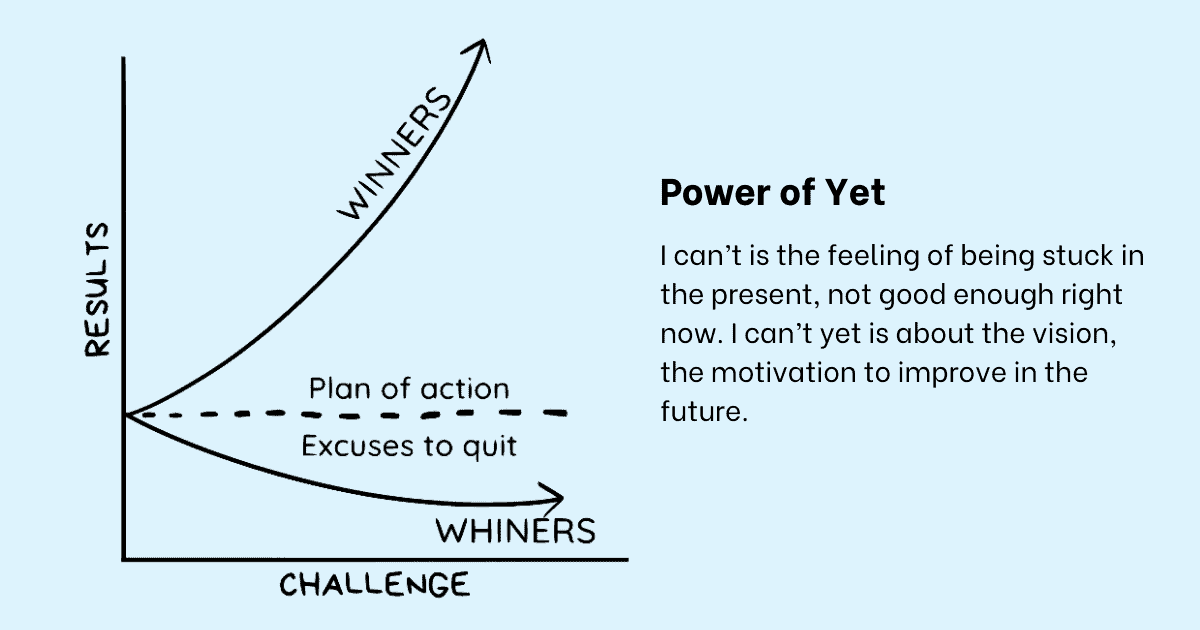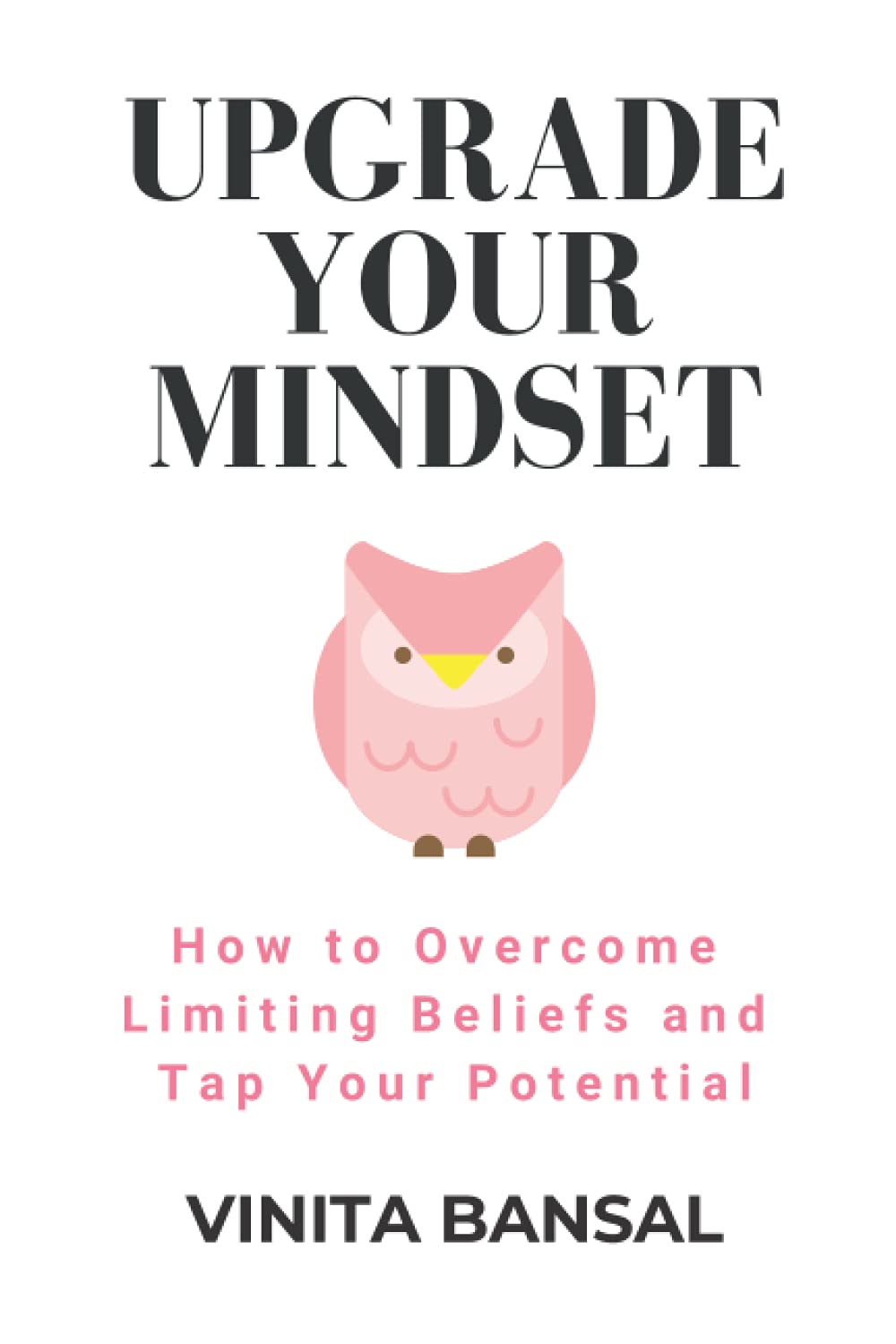Incredible Power of Yet: Positive Intervention to Help Us See Straight

As a small girl, my daughter Myra, now 8 years old, would often come to me saying:
I can’t skate down the slopes.
I can’t do this dance move.
I can’t fix this toy car.
All along, I simply asked her to complete the sentence with “yet” –
I can’t skate down the slopes yet!
I can’t do this dance move yet!
I can’t fix this toy car yet!
Saying “I can’t do” triggers a belief that she can never do it, it’s not within her reach. That makes her give up without trying hard enough. Saying “I can’t do…yet” signals she just can’t do it right now, but it’s always learnable. With more effort or better strategy, it’s achievable. One is about accepting defeat, the other is about embracing the challenge.
There’s another big difference between “I can’t do” and “I can’t do yet.” I can’t is the feeling of being stuck in the present, not good enough right now. I can’t yet is about the vision, the motivation to improve in the future.
It’s what Mark Gibson, a former member of the British National team who has been coaching kids since 1982 describes is the difference between winners and whiners. He says “The winners will create a long list of things they must do to learn the skill they want. I must learn to cast to handstand correctly. I must develop an efficient tap swing through the bottom. I must form a tight kick over the bar. Your whiners, on the other hand, will get busy creating a long list of excuses to justify their self-doubt. I’m a lousy caster. I can’t tap swing. I get scared when I’m upside-down. In other words your winners are forming a plan of action while the whiners are driving their roots of mediocrity deeper and deeper.”
I can’t do this…yet.
This doesn’t work…yet.
I don’t know…yet.
It doesn’t make sense…yet.
I don’t get it…yet.
I’m not good at this…yet.
“Yet.”
Power of yet in shaping up our future

The simple three-letter word “yet” is the sound of possibility, a positive intervention in our life to help us see straight. The nudge we all need to take control of our life by looking beyond the obstacles in the present to the opportunities of tomorrow. “Yet” carries with it the expectation that we can reach our destination. It creates an excitement into the future about all the incredible things we can’t do yet.
Human beings are naturally inclined to learn with a lifelong capacity for new ways of thinking and new ways of doing things. The sound of yet reinforces that curiosity. It reminds us that we may not be good enough yet, skilled enough yet and that intimidating thing staring down at us may scare the hell out of us, but it’s definitely within our reach. It may take a little longer, but we can get to it only if we try hard enough and long enough.
Seth Godin describes “yet” as a simple missing word.
He says “Yet isn’t the result of brazen persistence. It’s what we earn with learning, insight and generosity. Along the way, Yet turns can’t into haven’t. You can append it after any sentence related to your journey of achievement and contribution.
I haven’t finished the project
I haven’t learned how to juggle
I haven’t made the sale
YET.”
This is the incredible power of yet.
As this New York Times article points out, “If you’ve ever picked up a crossword puzzle and said to yourself, “I am not smart enough” or “I don’t have a big enough vocabulary for this,” here’s a little secret: A crossword puzzle is not a test of intelligence, and solving is not really about the size of your vocabulary. Becoming a good solver is about understanding what the clues are asking you to do.” You may not know how to solve a crossword puzzle yet. But, you can absolutely learn to do that.
This applies to everything. You aren’t born with all the skills you need in life, you have to work hard to build them.
- Can’t drive a car yet? You can learn to drive it.
- Can’t seal a deal yet? You can learn to negotiate better.
- Can’t shoot a hoop yet? You can learn to shoot hoops better.
When your fixed mindset wants to give up with “I can’t do,” use your growth mindset to correct it with “I can’t do…yet.” Yet with “what next” thinking can turn the obstacles in your path upside down. It can make possible that which didn’t seem possible earlier. It can show you a way out or another path to where you need to go.
- You haven’t failed in a task, you just haven’t succeeded…yet.
- You don’t give up when you don’t know the answer, you just haven’t found the answer…yet.
- You don’t quit with an attitude of “it can’t be done,” you persist with “I just haven’t figured it out…yet.”
Keep searching for ways to get better, to improve, to change your situation. There’s a chance you might find them. Give up and stop searching. I can guarantee you won’t find a thing.
Yet signals hope – a little voice in our head that tells us to not give up, to fight whatever obstacles stand in our way, to be creative with new strategies instead of feeling frustrated about what doesn’t work, to consider mistakes and failures as a sign of progress, to dream bigger, better and to make that dream possible.
Anything is possible only when we believe it is.
Utilizing the power of yet
Utilize the real power of yet by putting your beliefs into action:
Step 1: I Can’t do yet?
Is there something you don’t have a lot of experience with or a thing you don’t know how to solve yet?
- What are some of the problems you are facing?
- Anything you would like to change about yourself?
These are all great opportunities to build skills that will help you in the future. Make a list of things you “can’t do yet” that you would like to learn or “don’t do well yet” that you would like to improve. Now, write them down. Don’t forget to put “yet” at the end of each sentence.
Step 2: Try it one more time
What’s the one thing common between Thomas Edison, the Wright brothers, Michael Jordan, and numerous others who have achieved success?
They didn’t give up easily. They knew that doing anything significant requires more than one attempt. They changed their relationship with failure – iterating, failing, learning, and improving along the way. After all, when you try so many times and fail at something, you are not a failure. You now know for sure what doesn’t work. It’s a subtle shift in mindset, but an important one distinguishing between people who benefit from failure and those who don’t because they refuse to listen, learn and change.
Adopt that attitude. Not everything you do will require hundreds of hours and thousands of attempts. Mastering a skill may take years, but you can get pretty good at anything within just a few weeks or a few months with the right kind of attitude.
Pomodoro Planner Bundle
Break down your big goals into small tasks, limit distractions and build focus with this planner.
Step 3: Ask for help
Even after trying multiple times with better strategies and the right kind of effort, if you haven’t been able to make significant progress in your work, simply trying one more time won’t be helpful anymore. It’s time to ask for help.
Making progress does not mean working on your own, it also requires working with others. Others can help you see what you are otherwise not able to see. Some of the most admired and successful people in the world do this: they constantly ask for help. They embrace discomfort to get to the information they need, ask questions to clarify their thinking, and show curiosity in learning from others.
In a speech addressed to students, Barack Obama said “Don’t be afraid to ask questions. Don’t be afraid to ask for help when you need it. I do that every day. Asking for help isn’t a sign of weakness, it’s a sign of strength. It shows you have the courage to admit when you don’t know something, and to learn something new.”
Isn’t that true? Asking for help is indeed a sign of strength. It signals self-awareness of our limitations, humility to accept what we don’t know, and the courage to ask for it. More than anything, it’s a sign of confidence – confidence in our abilities to tackle whatever is standing in our way to get to where we need to go. The real risk isn’t receiving criticism, facing rejection, or sounding foolish. It’s not finding your way to the advice you need to move forward.
Just ask for help. You haven’t finished what you started…yet.
Step 4: Face your critics
Relentlessly pursuing an idea without making space for criticism can trap us within our own bubble preventing us from getting any better. We need to break out of this bubble, knock down the illusions we have about ourselves and open the door to active criticism. The only way to improve is to actively seek that which we cannot see ourselves or as Ryan Holiday puts it “become a student.”
In his book, Ego Is The Enemy, he writes “You can’t learn if you think you already know. You cannot get better if you’re convinced you are the best. The art of taking feedback is such a crucial skill in life, particularly harsh and critical feedback. We not only need to take this harsh feedback, but actively solicit it, labor to seek out the negative precisely when our friends and family and brain are telling us that we’re doing great.”
Learn to cut through the noise – identify the needle in the haystack, that one piece of wisdom that will help you put a step forward. Don’t ruminate or get overly consumed by things that aren’t useful or won’t help you get better.
“Yet” can be powerful. Not just for you but for everyone around you. Utilizing the power of yet doesn’t stop with you. You can create a difference in the lives of so many people you interact with on a daily basis. You can always take a moment to remind them (and in the process yourself) when they say they can’t do something or feel like giving up.
They probably don’t know how to do it…just yet.
Summary
- Yet is the sound of possibility. I can’t is the feeling of being stuck in the present, not good enough right now. I can’t yet is about the vision, the motivation to improve in the future.
- Don’t say you can’t do something, say you can’t do something…yet.
- Start with identifying the skills you want to build or the activities you want to complete.
- Achieving anything significant requires more than one attempt. Don’t rush in trying to accomplish a goal. Experiment, fail, repeat.
- If you haven’t been able to make significant progress, ask questions and reach out for help.
- Open yourself up to criticism. Criticism does not undermine your intelligence, it’s the harsh truth you need to face to see the hidden reality of your situation.
































